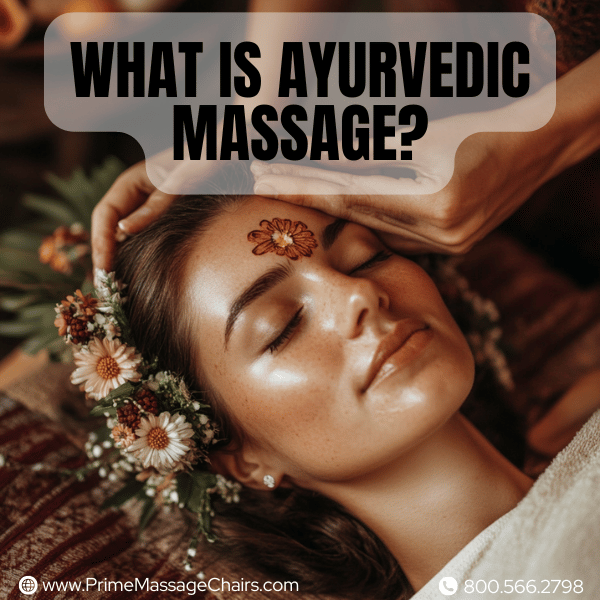
What Is Ayurvedic Massage: Everything You Need To Know!
Wondering what is Ayurvedic massage? This ancient Indian treatment is rooted in traditional practices and may help in relaxing both body and mind.
Our blog will explore Ayurvedic massage, from its types to potential benefits.
Let's get started!
Understanding Ayurvedic Massage
Ayurvedic massage may be a unique classification of bodywork. This methodology may utilize profound understanding from one of the antique healthcare systems globally.
It could aim to optimize both cognitive and physical health. Ayurveda may perceive wellness as a harmony of elements within us.
Massages may contribute by focusing on hidden energy junctures labeled as marmas.

The procedure transcends beyond mere touch. Competent practitioners may choose oils that correspond to your physique.
They may apply techniques that envelop your entire form.
These methods may cleanse your system, assisting with issues like arthritis and sleep disturbances, though these claims are based on traditional Ayurvedic beliefs and may not be universally accepted or scientifically proven.
Each contact may serve the purpose of healing and rejuvenating your complete self, guided by age-old knowledge but modified for the necessities of the current day.
Different Types of Ayurvedic Massages
Ayurvedic massages may come in many forms, each using special methods and oils to potentially heal and relax the body.
From full-body treatments that may coat you in warm herbal oils to focused therapy on your head and scalp for deep relaxation, there's a style for every need.
Abhyanga: Full-Body Oil Massage
Abhyanga is a type of Ayurvedic massage that focuses on the whole body. It may use warm, herb-infused oils customized for your dosha—vata, pitta, kapha.
These special oils nourish the skin and may help to improve circulation throughout your system.
Each part of your body may get 2-5 minutes of gentle strokes during a session that may last between 30-50 minutes.
This process may do more than just relax you; it could ready your body for detox practices like Panchakarma. Regular Abhyanga may enhance skin elasticity and support scalp health.
This full-body treatment promotes stress relief, which may help remove toxins from the body, and restore emotional balance.
By focusing on specific energy points with medicinal herbs in the oil, this massage therapy may deeply impact physical wellness while boosting mental clarity.
Enjoying Abhyanga regularly could be an essential part of self-care rituals aimed at holistic wellness.
Before anything else, always make sure to consult with a health care physician before trying this massage for yourself.
Exploring Marma Massage: Techniques and Benefits
After learning about Abhyanga, we move on to Marma massage. This type of Ayurvedic massage touches energy points that may help heal and boost blood flow.
It works on marma points, which are critical energy junctions linking body and mind. These practices go back thousands of years, between 1500 and 1200 BCE.
Marma massage may improve your energy, enhance blood circulation, lower stress, and ease pain.
Before starting, therapists may use warm oil for the massage. They might also use steam therapy and do gentle stretching with you.
After the massage, many people may feel lighter and more fully energized. They may also say that hey feel happier inside.
Shirodhara Therapy: Focus on Head and Scalp
Shirodhara therapy may be a key part of Ayurvedic massage, focusing on the head and scalp. It may use warm herbal oils, milk, buttermilk, herbal decoctions, or coconut water.
These liquids may be poured gently on the forehead.
This process may help heal the mind, body, and soul together. People may often feel less stressed and mentally tired after this treatment.

It may offer many potential health benefits like easing headaches, improving vision, managing high blood pressure, and enhancing thinking skills.
Those with oil allergies, or neck issues should avoid it.
Each session takes 45-60 minutes and can be done daily for up to 28 days depending on your health needs.
However, these benefits could vary among individuals and are not guaranteed for everyone. Always consult with a health care professional before trying any of these massages.
Health Benefits of Ayurvedic Massage
Ayurvedic massage may help your body in many therapeutic ways, like cleaning out toxins and improving blood flow.
It also may make you feel less stressed and may help you sleep well. This kind of massage may improve your skin’s appearance and relax tight muscles.
Detoxify Your Body and Enhance Circulation
Warm oils used in Ayurvedic massage may deeply detoxify your body. They may help get rid of toxins.
These oils may be chosen based on your dosha, which is your body type in Ayurveda. This ensures the oil works well for you.
As the massage therapist works, they may boost how well blood moves around your body.
This may help clean out waste and bring more oxygen everywhere.
Ayurvedic massage may clear away what your body doesn't need, according to Ayurvedic beliefs, making room for better health.
However, the concept of 'clearing away toxins' is not scientifically defined.
This process may also wake up your immune system. It could fight off sickness better because of improved circulation.
Achieve Stress Relief and Promote Better Sleep
Ayurvedic massage may help your heart beat slower and could lower blood pressure.
This is good for those who can't sleep well. A study showed that a 1-hour Abhyanga massage made 20 healthy people feel less stressed.
Their hearts slowed down too, making them feel more relaxed.

This type of massage may also help lower high blood pressure in people who are at risk of having hypertension.
So, if you often lie awake at night, Ayurvedic massage could be what you need to drift off easier. Plus, feeling less stressed may make your days smoother.
How Ayurvedic Massage Nourishes Skin and Relaxes Muscles
Ayurvedic massage may use warm herbal oils chosen for your body type, or dosha. These oils may soak into your skin, making it healthier and more elastic.
This kind of care may help with blood flow and could get rid of toxins through lymphatic drainage.
Your muscles may relax as the therapist's hands move over your body, easing tension and knots. This treatment may boost both physical and emotional well-being.
Stress may go down while immunity may go up. With regular sessions, you could notice smoother skin and less stiff muscles.
Preparing for Your Ayurvedic Massage
Consulting with an Ayurvedic Practitioner
Seeing an Ayurvedic doctor before your first massage may let you learn about your dosha.
This step is key for a massage that fits just right. Doshas are energy types: Pitta (fire), Vata (air and space), and Kapha (earth and water).
Your Ayurvedic expert may talk to you, figure out your dosha, and pick oils that go well with it.
The National Ayurvedic Medical Association has tools to help you find certified doctors who know about doshas and massages.
If you have health worries, it's smart to talk to a healthcare person before starting Abhyanga or any new wellness plan.
Determining Your Dosha and Selecting the Appropriate Oil
After talking to an Ayurvedic practitioner, the next step is finding your dosha and picking the right oil.
Your dosha may impact your health, and picking oils that match may boost the massage benefits.

Everyone may have a mix of Vata, Pitta, and Kapha in their body. But one is often stronger.
-
Vata skin may tend to be dry. For this, thick oils may work best. Sesame or almond oil could help.
-
Pitta skin may get hot or irritated easily. Lighter, cooling oils may be good here. You could try coconut or sunflower oil.
-
Kapha skin may often be oily. You may use thinner oils like mustard or corn oil to balance it out.
Choosing the right oil may make a big difference in how well an Ayurvedic massage works. It may combine ancient wisdom with natural care to support your health in a deep way.
Recommendations for Post-Massage Care
Importance of Hydration and Rest
Drinking at least six glasses of water after your Ayurvedic massage may help with detoxification.
This step is key for flushing out toxins from the body. Skipping stimulants such as coffee, alcohol, and soda drinks for a day may also boost this clean-up process.
Eating light meals may aid in recovery and healing post-massage. Getting plenty of rest may allow the body to repair itself more efficiently after treatment.
Together, these practices could support physical well-being following an Ayurvedic session.
Guidelines to Avoid Physical Strain After Massage
After your Ayurvedic massage, stay away from hard work. Your body and mind may need quiet time to relax fully.
Eat small snacks instead of big meals to avoid feeling too full. Keep off coffee and alcohol; they may undo the calm you just got from your massage.
Do some easy stretches too. This may help your muscles recover better. Listen to what your therapist says for after-care.
Drinking water is key too; it may keep you hydrated and helps flush out toxins from your body more easily after the massage.
FAQs
What Is an Ayurvedic Massage?
Ayurvedic massage, often known as Abhyanga, may involve a full-body massage with warm medicinal oils.
It's a traditional practice that aims to stimulate energy flow and detoxify the body.
How Is This Type of Massage Different From Others?
An Ayurvedic massage may differ from others like deep tissue or Swedish massages due to its unique approach.
The technique may use rhythmic strokes and focuses on "marmas," which are energy points in the body according to Ayurveda principles.
What Benefits Can I Expect From an Ayurvedic Massage?
Ayurvedic massages may offer numerous benefits including relaxation, improved circulation, reduced stress levels, better muscle tone, and skin nourishment through exfoliation and oil application.
Are There Specific Oils Used for This Kind of Therapy?
Yes! Oils used in Abhyanga may be chosen based on one's dominant dosha—Vata, Pitta, or Kapha—identified by an Ayurvedic practitioner during consultation.
Is There Anyone Who Should Avoid Getting an Ayurvedic Massage Treatment?
Contraindications exist, such as certain medical conditions, where it's best to consult with a physician before undergoing Ayurvedic treatments.
Where Can I Get an Authentic Ayurvedic Massage?
Kerala in India is known for its rich tradition in Ayurvedic massages, but many wellness centers worldwide could now offer this service.
Always ensure to consult with an Ayurvedic practitioner or a healthcare professional before starting any treatment.
Conclusion
An Ayurvedic massage may be a special way to heal and refresh your body and mind. It uses old knowledge and methods from India.
This massage may work on your whole body, paying attention to spots that could help energy flow better.
It may help with many health problems like sore joints and trouble sleeping. The oils used are picked just for you, making the experience unique.
So, trying out Ayurvedic massage could be a great step toward taking care of your health in a new way.
Disclaimer:
We do not provide medical advice. The content of this article, including text, graphics, and other material, is for informational purposes only. It is not intended to be a substitute for professional medical advice, diagnosis, or treatment. Always seek the advice of your physician or other qualified health provider with any questions you may have regarding a health condition. Never disregard professional medical advice or delay in seeking it because of something you have read in this article or on our website.
